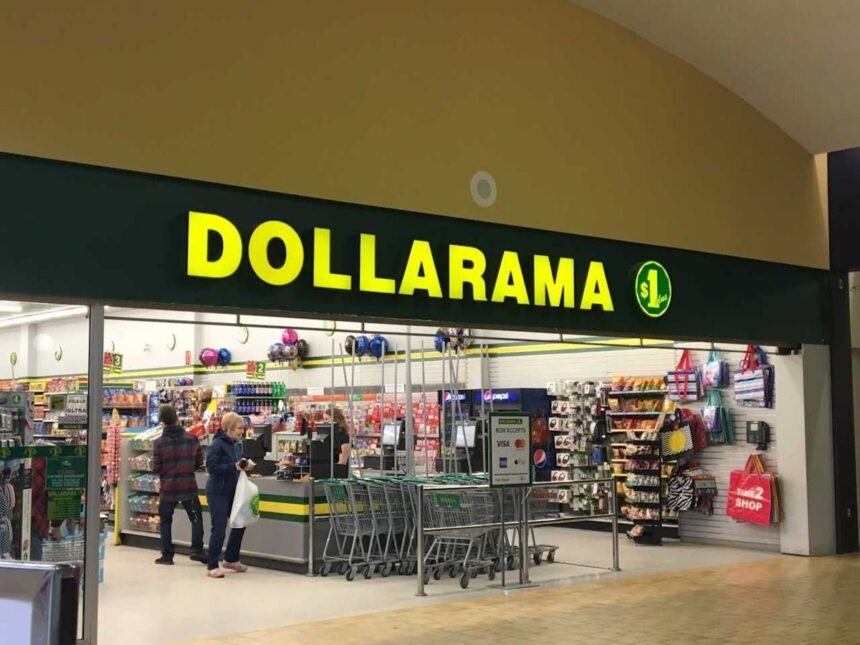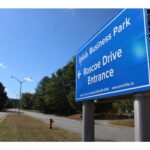“A dollar store might be better than nothing, but it might get in the way of the best options in the long term” says Food First NL CEO Josh SmeePublished Sep 02, 20257 minute readDollarama store in North Sydney Photo by Jeremy Fraser/File photoArticle contentWith another Dollarama having opened in St. John’s, inside the Torbay Road Mall, some people say it’s becoming harder to ignore the importance and stability that dollar stores are providing to customers as food and grocery prices continue to rise across the province and country. THIS CONTENT IS RESERVED FOR SUBSCRIBERS ONLY.Subscribe now to access this story and more:Unlimited access to the website and appExclusive access to premium content, newsletters and podcastsFull access to the e-Edition app, an electronic replica of the print edition that you can share, download and comment onEnjoy insights and behind-the-scenes analysis from our award-winning journalistsSupport local journalists and the next generation of journalistsSUBSCRIBE TO UNLOCK MORE ARTICLES.Subscribe or sign in to your account to continue your reading experience.Unlimited access to the website and appExclusive access to premium content, newsletters and podcastsFull access to the e-Edition app, an electronic replica of the print edition that you can share, download and comment onEnjoy insights and behind-the-scenes analysis from our award-winning journalistsSupport local journalists and the next generation of journalistsRegister to unlock more articles.Create an account or sign in to continue your reading experience.Access additional stories every monthShare your thoughts and join the conversation in our commenting communityGet email updates from your favourite authorsSign In or Create an AccountorArticle contentBoasting brightly lit aisles jam-packed with housewares, tools, snacks and shelf-stable food, dollar stores have become a go-to for cash-strapped families and individuals who find it easier there to stock up on a variety of meal options for just a few dollars. Article contentArticle contentArticle contentWhile dollar stores can offer some relief at the cash register compared to big box retailers and chain grocery stores, local experts warn that society’s reliance on dollar stores as a primary source of nutrition could have serious implications on the province’s already tumultuous food security situation, and could impact one’s ability to easily access fresh food in the years to come. Article contentAs Food First NL’s CEO Josh Smee explains, dollar stores undoubtedly benefit neighbourhoods and communities that didn’t previously have direct access to food or grocery items, but Smee warns that once these dollar stores establish a solid footprint in communities, it often means that fresh food retailers are kept at bay.Article content“As far as I understand it, research shows that once there is a dollar store there, that really lowers the chances that anyone will ever open a grocery store in that area,” Smee told The Telegram.Article contentArticle content“An area might start with a food desert, it might become a little bit less of a food desert, but dollar stores can get in the way in the long term of having access to the full range of foods in any given community. A dollar store might be better than nothing, but it might get in the way of the best options in the long term.”Article content‘NOT HUGE BENEFIT FROM COST PERSPECTIVE’Article content Food First NL CEO Josh Smee Photo by Juanita Mercer/The TelegramArticle contentWhile dollar stores might help you save a dollar or two in the moment, Food First NL CEO Josh Smee says they may not be saving you as much money as you might think.As a “downtownie” himself, Smee says he often frequents the Dollarama on Water Street for anything his family might need, be it a snack or a screwdriver, and was careful not to stigmatize anyone who relies on the dollar store for any purchase, food or otherwise. Article contentHowever, in peeling back the layers to find the true value of what dollar stores have to offer, Smee feels the benefits may not be as great as one might think.Article content“People don’t actually end up usually saving a ton of money on their household food budget from shopping at dollar stores,” he said.Article content“In practice, dollar stores often have stuff that’s in smaller quantities. If you don’t have very much money on hand that day, a dollar store can solve your problem, but shifting your purchasing to the dollar store actually isn’t a huge savings. It’s not a huge benefit for people, not from a cost perspective.”Article contentBeyond a false sense of saving, Canadian dollar store chains rarely, if ever, offer fresh produce or meat, which can cause individual complications over time if people rely on the processed and shelf-stable dollar store food offerings over a long period of time.Article content“Dollar stores generally don’t have any kind of fresh food selection,” he said.Article content“In other countries like in the United States, you’re seeing dollar stores starting to add fresh produce, which is interesting, but here, I’ve never seen a dollar store that does. It does also affect the diversity of things in your diet and all of that.” Article contentArticle contentUntil more family-owned hardware stores and independent grocery shops start popping up in instead of dollar stores, Smee says dollar stores will likely maintain their place in the market, as independent retailers struggle to compete with the purchasing power of large corporate conglomerates.Article contentFunctioning as a non-profit advocacy group for food security in Newfoundland and Labrador, Food First NL has been working to find ways for more neighbourhoods and communities to maintain a consistent supply of fresh, healthy food. Smee believes local community and retail partnerships can play a significant role in combatting the advantages held by corporate food retailers.Article content“One conversation that is becoming louder is the role that non-profit or community-owned retail solutions are playing here,” Smee said.Article content“Our organization, we run Food on the Move, which is a mobile affordable fresh food market and that’s one of the reasons it exists, is because it’s hard to find fresh foods in a lot of neighbourhoods in the city. We run a couple of food hubs where you can purchase local foods. As we look at this world where food prices continue to go up and looking at the way that our supply chain is, I think you will see more community-owned non-profits or organizations doing retail of some kind.”Article contentArticle content‘CITY ISN’T PROMOTING THIS’Article content As the Director of ‘Streets are for People’, Myles Russell feels the City of St. John’s could be doing more to promote independent access to fresh food. CONTRIBUTEDArticle contentLike Smee, Myles Russell agrees that having access to food at a dollar store is better than not having access to any food at all.Article contentAs the director of the grassroots urban advocacy group Streets are for People, Russell says municipalities can and should take on a larger role to help give individuals and families every opportunity to have access to healthy food, which in turn would lessen their reliance on dollar stores as their only option.Article contentWith the COVID-19 pandemic, and more recently the string of local wildfires shining a harsh light on the food security realities that the province is facing and will likely continue to face in the future, Russell feels the city should be doing more to promote the development of independent local grocery stores and help local entrepreneurs make this challenging business model a tenable one.Article content“The City of St. John’s does have the ability to confirm the types of businesses that are operated,” Russell told The Telegram.Article content“My wife and I were just in Toronto for a few days, and I was in Montreal the weekend before that. There are small grocers everywhere downtown in these cities. Anywhere you go in the dense parts of these cities, there are grocery stores. Food is the number one thing people need on a day-to-day basis. The fact that a lot of people are outside of walking distance from fresh healthy food, it forces more car poverty, it forces people to buy vehicles and our transit network is woefully inadequately connected to any food in general.” Article contentWith many municipalities prescribing what types of businesses can and cannot exist within specific zones in a city, Russell feels the city should have specific development guidelines in place to promote independent groceries, either through rezoning or regulation amendments. Article contentArticle content“The City of St. John’s could create a specialized zone for local grocery,” he said.Article content“If they are not going to change the zoning, at least make ‘small grocery’ a term. On the planning side, the city isn’t promoting this. They should be if we want a healthy and sustainable city.”Article contentSt. John’s mayor Danny Breen says he would love to see more fruit markets and independent grocery stores across the city and believes these businesses would be supported if local entrepreneurs were willing to take on the risk to open one. Article content“I certainly hope we do see more of those types of stores, but it’s something that the market and the people really dictate,” Breen told The Telegram.Article content“I think that the food security issue here is one that the province and the provincial government also needs to address very soon. I think there needs to be a lot more planning into that. I think people will support it if it’s there.” Article contentArticle contentCOLLABORATIVE EFFORT REQUIREDArticle content St. John’s Mayor Danny Breen says he would love to see more fresh food markets in the city, but feels big-picture solutions to food security issues come from collaboration between individuals, community groups and governments. Photo by The TelegramArticle contentWhile one new dollar store opening in St. John’s might not move the needle very far in terms of impacting how city residents are accessing fresh, healthy food, Smee, Russell and Breen all agree that some creative, collaborative solutions and some outside-the-box foresight may be required to tackle food security in the province in the long term, and to help loosen the collective reliance on dollar stores as grocery stores.Article content“Municipalities have a role to play in that, too, in how they set up their regulations,” Smee said.Article content“We assume that people are driving to stores which force people and municipalities to spend all of their money on all of the things to get a car there. I think the bigger part is the corporate food system has shifted, but cities have not always been friendly to having this kind of smaller retail segments.”Article content“There’s a role that the city plays in that,” Breen added.Article content“Again, like pretty much everything here, collaboration and working together and working through community groups and all levels of government is important to get these issues addressed.”Article content“You’re not going to get a fresh cut of fish or anything like that at a dollar store,” Russell said.Article content“That’s not a service they will ever offer, but that doesn’t mean St. John’s can’t promote smaller bakers and things like that in their regulations. As we are seeing a demographic shift of younger people holding off on even getting their drivers license, let alone driving, you have an extreme explosion of people using micro mobility like electric scooters and e-bikes and things like that. I think the city needs to look at how these people get served on their food needs.”Article content
As the number of ‘dollar stores’ grow in NL, questions arise about fresh food access











